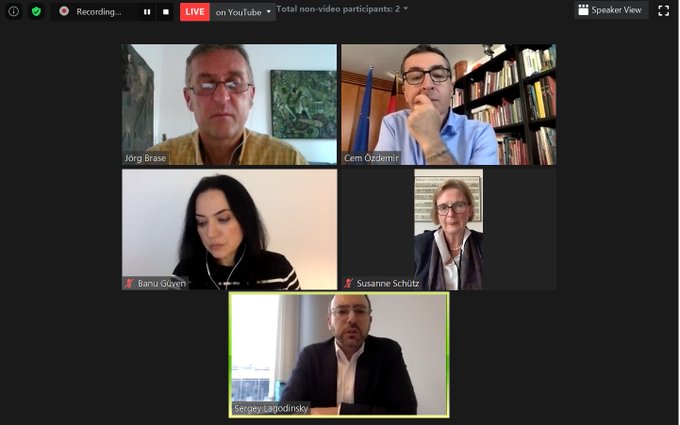As the current holder of the EU presidency, Germany has a crucial role in guiding the bloc’s policy toward Turkey. What strategy should Germany and the EU pursue in defending fundamental rights amid Turkey’s ongoing press freedom crisis?
That was the subject of a recent webinar hosted by the International Press Institute (IPI), together with the IPI Turkey and Germany National Committees (NC). The webinar, „Supporting Press Freedom in Turkey Under the German EU Presidency”, forms part of IPI’s ongoing webinar series on press freedom in Turkey.
The webinar, moderated by ZDF Turkey correspondent Jörg Brase, was joined by several prominent speakers: Cem Özdemir, member of the German Bundestag (Alliance 90/ Greens); Susanne Schütz, director of South-Eastern Europe, Turkey and EFTA States from the German foreign ministry; prominent Turkish journalist Banu Güven; and MEP Sergey Lagodinsky (Greens/EFA), chair of the Delegation to the EU-Turkey Joint Parliamentary Committee.
Schütz began her remarks by noting that monitoring press freedom and human rights in Turkey “is not something that is confined to 6 months in 2020”. Germany, she said, has been closely following the issue and raising it in bilateral talks, in international fora and in public statements. “We are watching media developments carefully, the number of journalists who are imprisoned, the number of journalists who are not able to work or who are leaving the country. This is something which we indeed find very concerning.”
But she also emphasized the importance of having a basis to talk to Turkey, highlighting the country’s important regional role. “The German government has always argued that we do not want to sever ties to Turkey. We do not want to exclude Turkey as a candidate member because we still believe that there are many people in Turkey who hope for a European future. But of course it’s clear that there will not be normal EU-Turkey relations as long as the human rights situation is not better.”
Need for a unified voice
Asked whether the EU was doing enough to support press freedom in Turkey, Özdemir responded: “We could do more, we have to do more. Unfortunately, the EU is divided when it comes to Turkey.” This lack of unity, Özdemir suggested, makes it more difficult to defend human rights.
So the first goal, he said, “should be to bring the EU together and unite on one position regarding Turkey. Whoever Turkish politicians meet, they should hear the same message: You have to free Selahattin Demirtaş and other politicians, you have to free Osman Kavala and other civil society representatives, you have to free Ahmet Altan and all the other journalists.”
Panellists also discussed the role of key geopolitical issues, such as the migrant crisis. Lagodinsky said the EU should not freeze when it comes to these issues just because they are scared of a migration “threat.” Güven agreed, stating that the how the EU should find a humane solution to the migration and refugee crisis once and for all so that Turkish President Erdoğan cannot use this card against the EU.
When the moderator Brase asked what the EU should do. Lagodinsky spoke in favour of having red lines. “This is something I wish from the German presidency”, he said. “Our red line is where civil rights and human rights in Turkey are being destroyed systematically by the Turkish politics”.
Worsening situation
What is clear is that, despite international criticism, press freedom in Turkey has not improved. Indeed, Güven said, the situation is getting worse and worse on all fronts in Turkey and press freedom is constantly under attack, with severe repercussions on political freedoms. “If there is no free media left, no one can guarantee fair elections and democracy”, Güven concluded.
Seit #Erdogan an der Macht ist, geht es bergab mit der #Pressefreiheit in der Türkei. Journalist*innen werden bedroht, weggesperrt & ermordet. Was kann 🇩🇪 für freie Presse in 🇹🇷 tun?
Freue mich auf Debatte mit @banuguven @SLagodinsky @GERonWEB @JorgBrase @globalfreemedia pic.twitter.com/352bMrwT0m— Cem Özdemir (@cem_oezdemir) September 29, 2020
She also painted a dark picture of the life of critical journalists in the country. “If you write about the government, critical things, under every post you send, you get threatened, targeted with hate speech. Your sort of get used to it.”
Fighting for Turkey’s place in Europe
Despite the clear challenges, there was widespread agreement among the panellists that a European perspective for Turkey was still worth fighting for.
“I still haven’t given up on a European future and a European perspective for Turkish society”, Lagodinsky said. “For that we have to continue fighting and the German presidency should continue fighting.”
Özdemir concluded: “We criticize the government and the regime. But not the people and the country. A democratic Turkey has its place in Europe. Erdogan doesn’t.”




